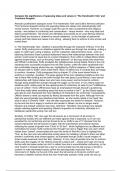Compare the significance of opposing ideas and values in ‘The Handmaid’s Tale’ and
‘Feminine Gospels’.
Atwood's postmodern dystopian novel 'The Handmaid's Tale' and Duffy's feminist collection
'The Feminine Gospels' portray the opposing ideas and values men stereotypically hold
versus women. However, on a larger scale this can be seen as patriarchal and religious
society - who believe in conformity and conservatism - versus women - who may rebel and
desire sexual freedom. Yet women are ultimately unsuccesful as as Laura Mulvey believes,
both Gilead and society is 'ordered by sexual imbalance', so the strength of patriarchal
society and their ideas and values is too strong - allowing them to enforce it onto women and
restrict them.
In ‘The Handmmaids Tale’, rebellion is personfied through the character of Moira. From the
outset, Duffy portrays her as rebellious against the status quo through her smoking, writing a
paper on 'date rape', being a lesbian, and her outspoken radical feminist views - such as
believing Germaine Greer's political lesbianism theory that relationships between men and
women could never be equal due to a power imbalance. Even while in college Moira rebels
against simple things, such as throwing "water balloons" on the boys below who stole hers
and Offred's underwear. Duffy escalates this rebelliousness during Gilead. Moira is the only
handmaid who succesfully escaped from the Red Centre, unlike the other handmaids who
feel comfortable staying where they are, highlighted by Duffy's metaphor of "Moira was like
an elevator with no sides" which made them "dizzy" to reflect how in contrast they are happy
to conform. However, Duffy juxtaposes this by chapter 37 of the novel where Moira is
working in a brothel, Jezebels. This goes against all her prior rebellious beliefs as she now
has to wear little clothing and be seen through the male gaze (Laura Mulvey), have sexual
relationships with higher status men who have more power; and be forced to conform,
through being treated like animal's through the 'tag[s)' on her wrist. In turn, Moira loses her
rebelious spirit, making way for the opposing idea of conformity, as seen by her "indifference,
a lack of volition". Here, Offred loses hope as emphasised through Atwood’s questioning
"have they really taken something away that was so central to her?", as the Gilead regime
was able to even brainwash the most rebellious of characters into conformity. Consequently,
Offred's desire to rebel (as inspired by Moira) decreases from this point. Although from the
start she was physically less rebellious than Moira - as she mostly rebels in her head, like
what is done in Orwell's '1984' - she still often expresses her desire for freedom. However,
by the end she too is happy to conform and remain in Gilead, as she no longer wants
freedom and instead 'wants] to stay here, with Nick'. Therefore, this portrays how despite
people rebelling against and opposing Gilead's imposition of conformity, ultimately in a
totalitarian patriarchal society men will win.
Similarly, in Duffy's 'Tall', she uses the tall woman as a microcosm of all women in
patraiarchal society who are different and rebel against what is expected, so in turn are
punished for not conforming and are forced to do so. Duffy's use of 17 stanzas from the
outset emphasises the tall woman's height, with the enjambment and internal rhymes
reflecting her speed of growth from '8 foot' to '30 foot' - which highlights her as different and
symbolises her power. Duffy continues this through how she is 'bigger than any man' which
makes them 'scared', emasculated and uses the simile of 'fled like a boy' to highlight this.
Thus, as the men who rule patriarchal society deem her rebellion a threat to them and other
women's conformity they protest against, as illustrated through Duffy's visual imagery of
'local crowds swarmed round her feet, chanting'. In turn, they physically force her to conform.
Duffy uses the imagery of 'her clothes would be curtains and… towels and rugs' and 'sat at
the bar with her knees under her chin' to reflect how she is uncomfortable conforming, or the
verb 'bowed' in 'bowed herself into a bar' to communicate how the tall woman is forced to
conform in male dominated society (which the steroetypically masculine 'bar' is a
micorcosm) of. Sadly, by the end of the poem the tall woman is forced to conform and
becomes a weather woman which the men rhetorically question 'what could she see up




